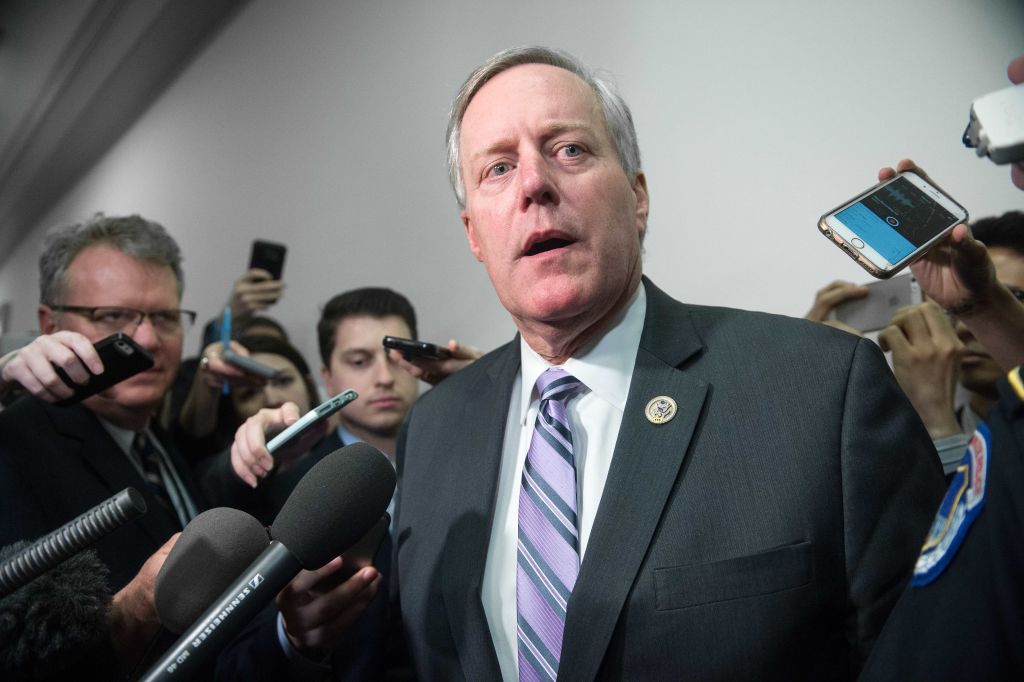The White House takes aim at ObamaCare's pre-existing condition ban in new health-care proposals


A free daily email with the biggest news stories of the day – and the best features from TheWeek.com
You are now subscribed
Your newsletter sign-up was successful
Vice President Mike Pence, White House Chief of Staff Reince Priebus, and White House budget director Mick Mulvaney met behind closed doors with members of the House Freedom Caucus on Monday night, after meeting with more moderate House GOP members earlier in the day, in the latest sign that President Trump hasn't given up on House Speaker Paul Ryan's health-care bill. Rep. Mark Meadows (R-N.C.), the Freedom Caucus leader, told The Associated Press that the White House made an informal offer but "there is no deal in principle" yet and his group is waiting to see details, in writing, before committing support.
The changes, Meadows said, center on allowing governors to apply for waivers to some big ObamaCare requirements, including that all health-care plans offer a set of essential health benefits and that insurers have to charge the same prices to everybody in the same age group, a mechanism called community rating. Scrapping both requirements, but especially community rating, would effectively negate ObamaCare's ban on discriminating against sick people and those with pre-existing conditions, Margot Sanger-Katz explains at The New York Times:
A patient with cancer might, for example, still be allowed to buy a plan, but it wouldn't do her much good if that plan was not required to cover chemotherapy drugs.... Technically, the deal would still prevent insurers from denying coverage to people with a history of illness. But without community rating, health plans would be free to charge those patients as much as they wanted. If both of the ObamaCare provisions went away, the hypothetical cancer patient might be able to buy only a plan, without chemotherapy coverage, that costs many times more than a similar plan costs a healthy customer. Only cancer patients with extraordinary financial resources and little interest in the fine print would sign up. [The New York Times]
Trump ally Rep. Chris Collins (R-N.Y.) told Politico that the moderates said they would tentatively be fine with the changes if the Freedom Caucus signed on, and White House legislative liaison Marc Short reportedly told attendees at Ryan's donor retreat late last week that outside conservative groups that opposed the AHCA have indicated a willingness to negotiate. Ryan pulled the deeply unpopular bill two weeks ago when it became clear it wouldn't pass, and it still faces long odds in the Senate if it manages to pass in the House.
The Week
Escape your echo chamber. Get the facts behind the news, plus analysis from multiple perspectives.

Sign up for The Week's Free Newsletters
From our morning news briefing to a weekly Good News Newsletter, get the best of The Week delivered directly to your inbox.
From our morning news briefing to a weekly Good News Newsletter, get the best of The Week delivered directly to your inbox.
A free daily email with the biggest news stories of the day – and the best features from TheWeek.com
Peter has worked as a news and culture writer and editor at The Week since the site's launch in 2008. He covers politics, world affairs, religion and cultural currents. His journalism career began as a copy editor at a financial newswire and has included editorial positions at The New York Times Magazine, Facts on File, and Oregon State University.
-
 Bad Bunny’s Super Bowl: A win for unity
Bad Bunny’s Super Bowl: A win for unityFeature The global superstar's halftime show was a celebration for everyone to enjoy
-
 Book reviews: ‘Bonfire of the Murdochs’ and ‘The Typewriter and the Guillotine’
Book reviews: ‘Bonfire of the Murdochs’ and ‘The Typewriter and the Guillotine’Feature New insights into the Murdoch family’s turmoil and a renowned journalist’s time in pre-World War II Paris
-
 Witkoff and Kushner tackle Ukraine, Iran in Geneva
Witkoff and Kushner tackle Ukraine, Iran in GenevaSpeed Read Steve Witkoff and Jared Kushner held negotiations aimed at securing a nuclear deal with Iran and an end to Russia’s war in Ukraine
-
 TikTok secures deal to remain in US
TikTok secures deal to remain in USSpeed Read ByteDance will form a US version of the popular video-sharing platform
-
 Unemployment rate ticks up amid fall job losses
Unemployment rate ticks up amid fall job lossesSpeed Read Data released by the Commerce Department indicates ‘one of the weakest American labor markets in years’
-
 US mints final penny after 232-year run
US mints final penny after 232-year runSpeed Read Production of the one-cent coin has ended
-
 Warner Bros. explores sale amid Paramount bids
Warner Bros. explores sale amid Paramount bidsSpeed Read The media giant, home to HBO and DC Studios, has received interest from multiple buying parties
-
 Gold tops $4K per ounce, signaling financial unease
Gold tops $4K per ounce, signaling financial uneaseSpeed Read Investors are worried about President Donald Trump’s trade war
-
 Electronic Arts to go private in record $55B deal
Electronic Arts to go private in record $55B dealspeed read The video game giant is behind ‘The Sims’ and ‘Madden NFL’
-
 New York court tosses Trump's $500M fraud fine
New York court tosses Trump's $500M fraud fineSpeed Read A divided appeals court threw out a hefty penalty against President Trump for fraudulently inflating his wealth
-
 Trump said to seek government stake in Intel
Trump said to seek government stake in IntelSpeed Read The president and Intel CEO Lip-Bu Tan reportedly discussed the proposal at a recent meeting
